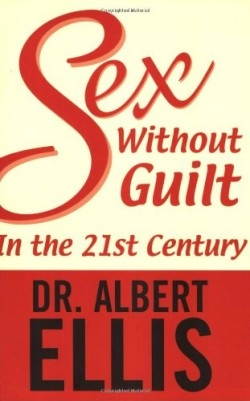
Sex Without Guilt in the 21st Century
“We have our sexual cake,” says the author, “but we don’t really eat it—or we gulp it down in such a manner as to bring on acute indigestion.” Ellis, a psychologist, indefatigable writer, teacher, and therapist for more than fifty years, here brings one of his first books into the present and future. While sexual life and talk has changed a great deal since the 1950s in the United States, we still struggle with an awkward mix of glut and deprivation, permissiveness and prudery, freedom of choice and government intrusion.
In the post-Playboy era, how radical is Ellis? Too much so for Oprah and most of the major media. In this book he has a chapter about sex without love or commitment. He neither endorses nor condemns it, but defends the right of competent adults to choose for themselves as long as no coercion or duplicity are involved. He rails against sexual and intellectual fascism—a philosophy that judges the worth of people in narrow, extreme, repressive terms and contributes to a double standard that still prevails: a woman who bears an unwanted or out-of-wedlock child is blamed; the man who co-produced it gets off lightly. Ellis includes a chapter on censorship, replete with dismaying episodes of having his articles bowdlerized or dropped. One of the most forbidden topics has always been that most common, harmless, usually beneficial activity known as masturbation.
Strongly oriented to rationality and choice, Ellis seeks his own pleasure experience in sexual adventurism. He holds himself and others to high ethical standards and allows that some, even many, people will be content—even happy and fulfilled—with what to him would be a monotonous sexual life. Those who prize commitment with total fidelity may argue that it is he who is missing something. In any case, he does not quibble about preferences that are freely chosen and enjoyed. Ellis, once an advocate of therapy for homosexuality, sees that obviated by greater social acceptance of difference. He believes that most people are fundamentally bisexual, and can learn to go either way.
While Viagra is not mentioned, one can safely infer that Ellis sees it as a quick fix for what is usually a psychological or relationship problem. The pharmaceutical industry does not seem to care whether doctors explore their patients’ relationships and sexual attitudes; a pill can mask the problem of impotence.
The irony of deprivation in the midst of sexual glut remains. This book costs less than a couple of those pills, and goes deeper than chemistry in solving many problems that continue long after the sexual revolution.
Disclosure: This article is not an endorsement, but a review. The publisher of this book provided free copies of the book to have their book reviewed by a professional reviewer. No fee was paid by the publisher for this review. Foreword Reviews only recommends books that we love. Foreword Magazine, Inc. is disclosing this in accordance with the Federal Trade Commission’s 16 CFR, Part 255.
